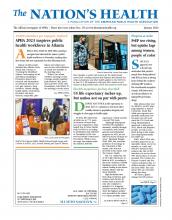
The Supreme Court ruling that colleges could not base their admissions on race was a blow to diversity, but it does not prohibit recruitment, experts say. Accelerating college recruitment may help retain a diverse student body in higher education.
Photo by SDI Productions, courtesy iStockphoto
“That is one of the biggest misconceptions being perpetuated today. This decision severely narrowed affirmative action, but it in fact did not end affirmative action.”
— Dayna Matthew
While last year’s Supreme Courtruling against affirmative action in college admissions is changing the way schools handle some of their processes, it is not ending the quest for diversity on college campuses, according to speakers at APHA’s 2023 Annual Meeting and Expo.
In June, the high court ruled that higher education institutions could not base their admissions on race, ending a policy that had opened college education to a wider range of students and helped diversify the nation’s health workforce. The decision rolled back decades of precedent that boosted student diversity. Diversity in jobs that require higher-level degrees, including public health, will be also impacted by the decision.
But the Supreme Court decision affects only admissions — it does not prohibit recruitment, said APHA member Ayman El-Mohandes, dean of the City University of New York Graduate School of Public Health and Health Policy, in November.
He called for schools of public health to quadruple efforts to recruit students from a range of backgrounds to help create a student body and workforce that best serve the needs of the diverse American population.
Admitting students from underrepresented groups enriches programs and the classroom experience for all students, he told meeting participants.
“We are not doing them a favor, they are doing us a favor,” he said.
Schools can reduce barriers by eliminating prerequisite requirements and application fees, said Laura Rasar King, EdD, MPH, MCHES, executive director of the Council on Education for Public Health.
Early-decision programs are another area for intervention, she said, as they can create obstacles by asking students to commit to a school before they have information on what their financial aid package looks like.
“Institutions can do a lot to eliminate barriers, or at least reduce barriers, as well as do affirmative work toward a diverse student body,” King said.
Despite common belief, the court’s decision does not dismantle affirmative action, said APH Amember Dayna Bowen Matthew, JD, PhD, dean of the George Washington University Law School.
“That is one of the biggest misconceptions being perpetuated today,” Matthew said. “This decision severely narrowed affirmative action, but it in fact did not end affirmative action. I should say that it only ended it to the extent that we let it.”
To help eradicate unjust discrimination in the U.S., public health professionals must embrace partnerships among science, medicine, education and law, Matthew said. Social and economic factors determine 40% of an individual’s health outcomes.
“Have the courage to identify structural racism as one of the primary causes — not only in theory, not only in data— but also to act up on it, to recognize that what we must do is partner together,” Matthew said.
A version of this story was published on APHA’s Annual Meeting Blog.
- Copyright The Nation’s Health, American Public Health Association









